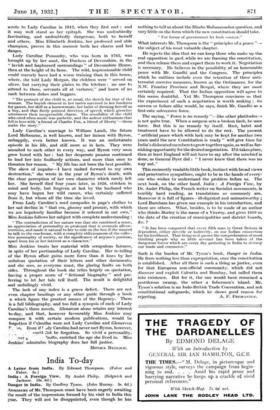India. To–day
Danger in India. By Geoffrey Tyson. (John Murray. 38. 6d.) ADMIRERS of Mr. Thompson must have been eagerly awaiting the result of the impressions formed by his visit to India this year. They will not be disappointed, even though he has
nothing to tell us about the Hindu-Muhammadan question, and very little on the form which the new constitution should take.
" For forms of government let fools contest."
What interests Mr. Thompson is the " principles of a peace the subject of his most valuable chapter.
He rejects the idea that we can keep those who make up the real opposition in gaol, while we are framing the constitution, and then release them and expect them to work it. Negotiation is necessary. He believes in the possibility of an honourable peace with Mr. Gandhi and the Congress. The principles which he outlines include even the retention of those anti- terrorist coercive measures, known as the Ordinances, for the N.W. Frontier Province and Bengal, where they are most certainly required. That the Indian opposition will agree to this seems doubtful. Yet Mr. Thompson convinces us that the experiment of such a negotiation is worth making ; its success or failure alike would, he says, finish Mr. Gandhi as a first-rate subversive force.
The saying, " Force is no remedy "—like other platitudes— is not quite true. When a surgeon sets a broken limb, he uses force. But this is no remedy by itself. Rest, habit and treatment have to be allowed to do the rest. The present " artificial peace which with luck may be kept for another two years until the new Constitution is ready " will give time for India's dislocated members to grow together again, as well as fur- nishing opportunity for the desired negotiation. If it takes place, then at least England will not have to say after the mischief is done, as General Dyer did : " I never knew that there was no way out."
This eminently readable little book, instinct with broad views and penetrative sympathies, ought to be in the hands of every- one who wishes to understand the problem before us. The next book, on the other hand, India : A Foreign View, by Dr. Andre Philip, the French writer on Socialist movements, is terribly hard reading, as translations so commonly are. Moreover it is full of figures—ill-digested and untrustworthy ; Lord Burnham has given one example in his introduction, and there are others. What, besides, is to be made of an author who thinks Morley is the name of a Viceroy, and gives 1919 as the date of the creation of municipalities and district boards, Sce. ?
"It has been computed that every fifth man in Great Britain is dependent, either directly or indirectly, on our Indian connection for his livelihood. That being so it passes the comprehension of most thinking people why so little account has been taken of the dangerous forces which are every day gathering in India to destroy our trade and commerce."
Such is the burden of Mr. Tyson's book, Danger in India. He fears nothing less than expropriation, once the constitution is established. After all there is such a thing as justice, even for that European non-official community, which did not discover and exploit Calcutta and Bombay, but called them into existence. But for it, the one would have remained a pestiferous swamp, the other a fishermen's island. Mr. Tyson's solution is an Indo-British Trade Convention, and not constitutional safeguards, which lie shows good reason for








































 Previous page
Previous page